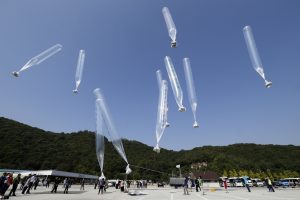In the statement published by North Korea’s state media KCNA on Thursday, Kim Yo Jong, the powerful sister of the North Korean leader Kim Jong Un and the main voice of inter-Korean relations, said that the country’s COVID-19 crisis was South Korea’s fault.
“Now that many countries in the world are taking more effective anti-epidemic measures, realizing once again the danger of the spread of the malignant pandemic disease through contact with the objects infected with the malicious virus, it is a matter of grave concern that the disgusting ones in south Korea stage a farce of scattering leaflets, bank notes, awful booklets and things over our territory,” the statement quoted Kim as saying during the National Meeting of Reviewing Emergency Anti-epidemic Work on Wednesday.
When North Korea’s state media unexpectedly announced its first case of the coronavirus in May, its propaganda blamed the leaflets and objects sent from a civic organization led by Park Sang-hak, who defected to South Korea decades ago. The leaflets and other objects are believed to have been sent by Park weeks before the North confirmed its first case of the virus in May.
“It is the universally accepted opinion of the international community that it is necessary to thoroughly disinfect the surface of objects as the malignant virus spreads via objects,” Kim said. “Such scientific clarification can never change no matter how desperately anyone may deny.”
As COVID-19 normally spreads from person to person, between people who are in close contact with each other, the South Korean Unification Ministry again denied the accusation by saying there is no connection between leaflets sent over the border and COVID-19 cases.
However, North Korea seems to have concluded that South Korea will be held responsible for the outbreak, as Kim warned that the countermeasure against the “uninterrupted influx of rubbish from south Korea” would be “a deadly retaliatory one.”
“If the enemy persists in such dangerous deeds as fomenting the inroads of virus into our Republic, we will respond to it by not only exterminating the virus but also wiping out the south Korean authorities,” Kim said.
During the meeting, North Korea’s supreme leader Kim Jong Un declared victory in “the maximum emergency anti-epidemic campaign,” which he kicked off months ago.
For the past three months, North Korean state media had published daily counts of the number of fever patients and casualties, as other countries have done. The considerably low number of fever patients and casualties raised suspicion among experts, as there should have been more confirmed cases and deaths based on the figures in other countries – especially because North Korea lacks the proper medical treatments and vaccines. Yet on Wednesday Kim proudly declared his victory against the highly contagious virus.
As Pyongyang officially ended the devastating battle against COVID-19, it will likely resume testing short-range ballistic missiles targeting the South’s soil as an extension of Kim Yo Jong’s address.
After North Korea blew up the joint inter-Korean liaison office in 2020, the former Moon Jae-in administration and the Democratic Party enacted and passed a law banning sending leaflets and other objects toward the North. The main reason for enacting the law was to protect people living near the border with the North.
The People Power Party strongly criticized the law, slamming the Democratic Party and the Moon government for a “disgraceful submission to Kim Yo Jong’s order.”
U.S. House Representative James McGovern, who is a co-chair of the Tom Lantos Human Rights Commission, also expressed his pessimistic view over the law and recommended that the National Assembly revise the law, as it may suppress the freedom of expression.
South Korea now has a president from the PPP, Yoon Suk-yeol, but without control of the legislature his options are limited. Because nearly two-third of 300 lawmakers are members of the Democratic Party, it is unlikely the law will be revised to allow North Korean defectors to distribute leaflets and other items toward the North. The Yoon government will likely try to revise or withdraw the law if it regains a majority in the National Assembly in the 2024 elections.
Park, the North Korean defector, kept sending leaflets toward the North even after the law passed at the National Assembly, including a batch sent in late April. He was indicted under the law in January 2022 and is standing trial.
Experts and North Korean defectors have consistently argued that the Kim regime is profoundly afraid of outside information being spread to the people. Pyongyang has never allowed its people to get access to foreign media, but such restrictions have been strengthened since the South Korean drama, “Crash Landing on You,” brought a huge viewership in early 2020.

































